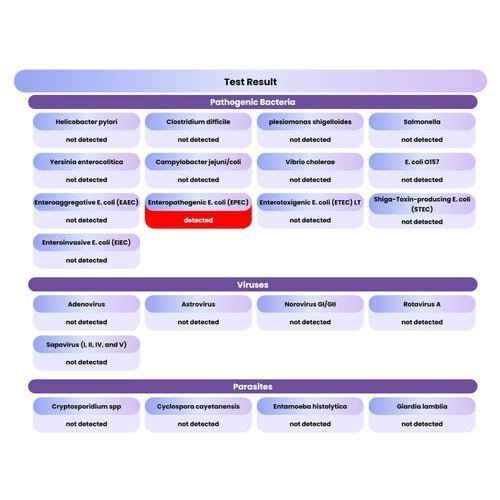
Reviewed by Saskia Knight DipNT, Nutritionist
Last reviewed on January 20th, 2025
Cyclospora cayetanensis is a tiny parasite that causes cyclosporiasis, an infection of the intestines that leads to long-lasting watery diarrhoea and other unpleasant symptoms which can persist for weeks or even months. Cyclospora spreads when people consume contaminated food or water and does not usually spread from person to person.
In the UK, Cyclospora cayetanensis infections are very rare and are not commonly found in locally grown food. Travellers to tropical and subtropical areas, particularly Central and South America, Southeast Asia, and the Caribbean are most at-risk. Outbreaks in the UK are often linked with travel to Mexico.
How is it spread?
Cyclospora cayetanensis is most commonly spread by consuming food or water that contains the parasite’s oocysts. Oocysts are microscopic parasite ‘eggs’ that hatch inside the intestines and are the contagious form of the parasite.
When a person ingests food or water contaminated with these oocysts (for example, through poor hygiene or contaminated water), the oocysts ‘hatch’ in the intestines, releasing the active form of the parasite.
Cyclospora cayetanensis oocysts need to mature (sporulate) outside the body in order to become infectious. This usually takes 1 – 2 weeks therefore direct person-to-person transmission is unlikely.
Cyclospora cayetanensis is spread through:
Contaminated food:
Imported fresh fruits and vegetables (e.g., berries, basil, coriander, or lettuce) can become contaminated during growing or washing, especially if they are irrigated with untreated or contaminated water.
In the UK, most reported infections are linked to travel or imported produce rather than locally grown foods.
Contaminated water:
Drinking untreated or contaminated water in high-risk regions can lead to infection.
Is Cyclospora found in the UK?
Cyclospora is not found in the UK, in-fact most cases reported in the UK are the result of having returned travelling from high-risk tropical or subtropical regions including Central America, South America, Southeast Asia and the Caribbean.
If you are due to travel abroad to a high risk area, we recommend reading the governments travel advice.
What symptoms does Cyclospora cause?
The main symptom of cyclosporiasis is watery diarrhoea that can last for several days or even weeks if untreated. The symptoms may come and go (relapse) over time.
Common symptoms:
- Watery diarrhoea
- Stomach cramps and bloating
- Nausea and vomiting
- Fatigue and weakness
- Loss of appetite and weight loss
- Temperature/fever
When to seek medical advice
You should seek medical advice if you have recently visited a high-risk area and are experiencing any of the symptoms listed above. Additionally, you should seek medical attention if you experience any of the following symptoms:
- Watery diarrhoea lasting longer than 7 days
- Severe dehydration (dry mouth, little or no urine, dizziness)
- Inability to keep fluids down due to vomiting
- Severe stomach pain or bloating
Gut Parasites share many of the same common symptoms, if you suspect you have a parasite you should contact your GP.
Who is most at risk?
The UK is generally considered a low-risk area as the parasite is not found here. People who are most at risk of infection include:
Travellers to high-risk areas such as Central and South America, Southeast Asia, and the Caribbean.
Immunocompromised individuals with weakened immune systems (due to HIV, cancer treatment) may have more severe or prolonged infections.
How is it diagnosed?
Cyclospora infection is diagnosed through stool sample testing to check for the parasite's oocysts. However, because oocysts (the "eggs" of the parasite) may not always show up in a single sample, doctors may ask for multiple stool samples over a few days.
How to test for Cyclospora cayetanensis
There are several tests that can be used to test for parasites including Cyclospora, for example, microscopy staining and antigen testing.
Our preferred method of testing is a stool test which detects the parasite’s DNA in a stool sample and is highly accurate. A stool sample can be done at home and is less evasive.
In the UK, Cyclospora testing may be recommended if you’ve recently travelled to a high-risk country and are experiencing symptoms upon your return.
Our gut parasite test identifies 28 different types of parasites, pathogenic bacteria and viruses via an at-home stool sample test.
How is it treated?
Cyclospora will usually clear on its own after a couple of weeks. However, if symptoms persist or worsen after this time, a doctor may prescribe you with antibiotics to help clear the infection.
What helps with recovery?
Gut parasites can cause gut dysbiosis, which is an imbalance of the bacteria within the gut microbiome. A gut imbalance can also present a number of unpleasant symptoms. To aid in your recovery and to rebalance your microbiome, eat the following gut friendly foods known to boost beneficial gut bacteria.
High fibre diet: Including foods like - fruits, vegetables, whole grains, nuts, legumes, and seeds. Introduce fibre to your diet slowly and remember to drink plenty of fluids.
Probiotic-rich foods: Foods like yoghurt, kefir, and fermented vegetables like kimchi and sauerkraut may help replenish healthy gut bacteria.
Avoid alcohol, caffeine, greasy, sugary and spicy foods, as they can worsen diarrhoea.
Read our guide on good gut foods for a full breakdown of foods that can help to improve your gut health.
Can it be prevented?
Cyclospora spreads through contaminated food and water, and while several precautions can reduce the risk of infection, there is no guaranteed way to completely prevent infection if you are exposed to the parasite.
Food safety hygiene:
Wash fresh produce thoroughly: Even imported fruits and vegetables should be rinsed under running water before eating, even if you plan to peel them.
Avoid raw produce when travelling: In tropical regions, avoid eating uncooked leafy greens, herbs, or berries unless you’re sure they have been safely prepared.
Cook food thoroughly: Heat kills the parasite, so eating freshly cooked meals is safer.
Water safety:
Drink bottled or boiled water when travelling in high-risk areas.
Avoid adding ice cubes into your drink.
Hygiene:
Wash your hands thoroughly with soap and water after using the bathroom and before eating.
Avoid drinking or swimming in untreated natural water sources like lakes or rivers in high-risk regions.
The role of gut health in recovery
A healthy gut microbiome helps support your immune system and can speed up recovery from infections. A diverse and balanced gut flora may also help the intestines recover from inflammation caused by parasites.
By testing your gut microbiome and screening for parasites, you can better understand your gut health and identify potential imbalances that could make you more vulnerable to infections like Cyclospora.
By following good food hygiene, supporting your gut with nutritious foods, and being mindful when traveling, you can lower your risk of infection and protect your overall digestive health.


